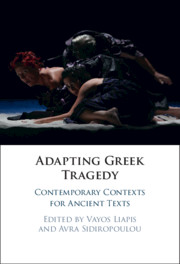Book contents
- Adapting Greek Tragedy
- Adapting Greek Tragedy
- Copyright page
- Contents
- Figures
- Contributors
- Preface
- Introduction
- Prelude
- Part I Adapting Greek Tragedy
- Part II Adaptation on the Page and on the Stage
- Chapter 5 Interlude
- Chapter 6 The View from the Archive
- Chapter 7 Compromise, Contingency, and Gendered Reception
- Chapter 8 Technology, Media, and Intermediality in Contemporary Adaptations of Greek Tragedy
- Chapter 9 Violence in Adaptations of Greek Tragedy
- Chapter 10 Adaptations of Greek Tragedies in Non-Western Performance Cultures
- Chapter 11 Cultural Identities
- Chapter 12 Trapped between Fidelity and Adaptation?
- Chapter 13 Adaptation and the Transtextual Palimpsest
- Bibliography
- Index
Chapter 12 - Trapped between Fidelity and Adaptation?
Οn the Reception of Ancient Greek Tragedy in Modern Greece*
from Part II - Adaptation on the Page and on the Stage
Published online by Cambridge University Press: 12 March 2021
- Adapting Greek Tragedy
- Adapting Greek Tragedy
- Copyright page
- Contents
- Figures
- Contributors
- Preface
- Introduction
- Prelude
- Part I Adapting Greek Tragedy
- Part II Adaptation on the Page and on the Stage
- Chapter 5 Interlude
- Chapter 6 The View from the Archive
- Chapter 7 Compromise, Contingency, and Gendered Reception
- Chapter 8 Technology, Media, and Intermediality in Contemporary Adaptations of Greek Tragedy
- Chapter 9 Violence in Adaptations of Greek Tragedy
- Chapter 10 Adaptations of Greek Tragedies in Non-Western Performance Cultures
- Chapter 11 Cultural Identities
- Chapter 12 Trapped between Fidelity and Adaptation?
- Chapter 13 Adaptation and the Transtextual Palimpsest
- Bibliography
- Index
Summary
Modern Greece offers us a distinctive example of the reception of ancient drama that testifies to the complications introduced by questions of national identity, vested ideological interests, and deep political divisions. On the modern Greek stage, the performance of ancient Greek drama has been characterised by an ongoing struggle between tradition and innovation. The traditional approach privileges ‘authenticity’, as part of a wider intellectual project that seeks to invest modern Greece with the glamour and cultural capital of ancient Greece. This chapter investigates the tension between this inherently conservative approach to performing ancient drama and freer, more innovative responses, as exemplified by the work of one of the country’s premier theatrical companies, the National Theatre of Greece. My analysis focuses on four representative case studies, two from 2000 and two from 2015–16, as a representative sample from the opposite ends of the tradition vs. innovation spectrum.
Keywords
- Type
- Chapter
- Information
- Adapting Greek TragedyContemporary Contexts for Ancient Texts, pp. 329 - 354Publisher: Cambridge University PressPrint publication year: 2021

